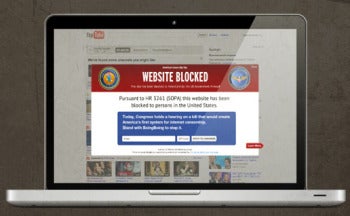SOPA and PIPA: Just the Facts
The Stop Online Piracy Act (SOPA) and Protect IP Act (PIPA) have been making headlines, but what are they, exactly? Here are the facts.
By
Jared Newman,
PCWorld

The Stop Online Piracy Act and the Protect IP Act are getting more negative attention, as major websites such as
Wikipedia plan to protest the bills with blackouts on Wednesday. Even Google will join the action, with a link on its homepage explaining why the company opposes the legislation.
But what are SOPA and PIPA, exactly, and why are tech luminaries lambasting legislation aimed at stamping out copyright infringement? Read on for a full explanation.
SOPA and PIPA: The Basics
Media companies are always looking for new ways to fight piracy. They've tried
suing individual users, getting Internet service providers to
take action against subscribers, and working with the U.S. government to
shut down domains based in the United States. But none of those actions can stop overseas websites such as The Pirate Bay and MegaUpload from infringing copyrights, or prevent Internet users from accessing those sites.
Enter SOPA, in the U.S. House of Representatives, and PIPA, in the U.S. Senate. Both bills are aimed at foreign websites that infringe copyrighted material. The bills are commonly associated with media piracy, but
may also apply to counterfeit consumer goods and medication.
Originally, both bills provided two methods for fighting copyright infringement on foreign websites. In one method, the U.S. Department of Justice could seek court orders requiring Internet service providers to block the domain names of infringing sites. For example, Comcast could prevent its customers from accessing thepiratebay.org, although the underlying IP address would still be reachable. This
ISP-blocking provision was a major concern among Internet security experts, and both SOPA and PIPA have dropped it.
The other tool would allow rights holders to seek court orders requiring payment providers, advertisers, and search engines to stop doing business with an infringing site. In other words, rights holders would be able to request that funding be cut off from an infringing site, and that search links to that site be removed. The site in question would have five days to appeal any action taken.
Although the House and Senate bills are similar, SOPA is the more extreme of the two. It defines a "foreign infringing site" as any site that is "committing or facilitating" copyright infringement, whereas PIPA is limited to sites with "no significant use other than" copyright infringement. More details on
SOPA and
PIPA are available through the Library of Congress website.
Arguments for and Against SOPA and PIPA

Opponents of SOPA and PIPA believe that neither piece of legislation does enough to protect against false accusations. As the Electronic Frontier Foundation
argues, provisions in the bill grant immunity to payment processors and ad networks that cut off sites based on a reasonable belief of infringement, so even if claims turn out to be false, only the site suffers. "The standard for immunity is incredibly low and the potential for abuse is off the charts,"
says the EFF.
Meanwhile, sites that host user-generated content will be under pressure to closely monitor users' behavior. That monitoring already happens on larger sites such as YouTube, but it could be a huge liability for startups, the EFF argues.
Some progressive pundits have argued that media companies are trying to legislate their way out of what's really a business-model problem. "As we've seen over and over again, the most successful (by far) 'attack' against piracy is awesome new platforms that
give customers what they want, such as Spotify and Netflix,"
TechDirt's Mike Masnick writes.
SOPA and PIPA supporters argue that prophecies of a broken Internet are overblown. Cary Sherman, CEO of the Recording Industry Association of America, writes that
SOPA clearly defines infringing sites based on Supreme Court holdings and the Digital Millenium Copyright Act, and requires rights holders to follow a strict set of rules when trying to get payment cut off to an infringing site. False claims, Sherman argues, "can result in damages, including costs and attorneys' fees."
Sherman also points out that previous actions against infringing sites, such as the
MGM vs. Grokster case in 2005, triggered similar doomsday predictions from the tech industry, yet digital music innovation has flourished since then.
Who's for SOPA and PIPA, and Who's Against?

Representative Lamar Smith (R-Texas) is the author of SOPA, which is backed by
31 cosponsors in the House. Senator Patrick Leahy (D-Vermont) wrote PIPA, which has
40 cosponsors in the Senate. ProPublica has a
visualized list of supporters in both the House and Senate.
The White House has
expressed concerns about the bills in their current state, writing in a statement that "any effective legislation should reflect a wide range of stakeholders, including everyone from content creators to the engineers that build and maintain the infrastructure of the Internet."
As for outside parties, the
list of SOPA supporters consists mostly of media companies, including record labels, TV networks, movie studios, and book publishers. Some companies with an interest in fighting sales of other counterfeit goods, such as beauty-product maker Revlon and pharmaceutical company Pfizer, also appear on the list.
Opposition to SOPA and PIPA is strong in the tech sector. An
open letter to Washington speaking out against the legislation was signed by founders of Craigslist, eBay, Google, Mozilla, Twitter, and Wikipedia, among others.
In the middle are companies at the intersection of media and technology. Many video game publishers have stayed silent on the matter while their trade group, the Entertainment Software Association, supports the bills. The Business Software Alliance originally supported the bill, but
withdrew its support after deciding that the legislation went too far. As for Apple and Microsoft, which are both BSA members, the former has not come out publicly for or against SOPA or PIPA, while the latter now says that it
opposes SOPA "as currently drafted."
Where Are SOPA and PIPA Now?
Both bills have taken a hit in the last week, as their authors have decided to remove the provisions that require Internet service providers to block the domain names of infringing sites. SOPA, which has yet to pass out of the House Judiciary Committee, is reportedly
stalled, as lawmakers continue to work on the bill. Representative Darrell Issa (R-California) has proposed an alternative bill that is far more narrow in its focus.
Voting on PIPA, however, is scheduled to begin in the Senate on January 24.
UPDATE: (2pm ET 1/18) Now two U.S. Senators are withdrawing their sponsorships of PIPA. Sen. Marco Rubio, of Florida,
wrote on Facebook that although he has a strong interest in stopping piracy, "we must do this while simultaneously promoting an open, dynamic Internet environment that is ripe for innovation and promotes new technologies." Senator Roy Blunt, of Missouri, also bailed on the bill,
writing on Facebook that "the Protect IP Act is flawed as it stands today, and I cannot support it moving forward."
Follow Jared on Twitter, Facebook, or Google+ for even more tech news and commentary.
Originally Posted by http://www.pcworld.com/article/248298/sopa_and_pipa_just_the_facts.html
The Stop Online Piracy Act and the Protect IP Act are getting more negative attention, as major websites such as Wikipedia plan to protest the bills with blackouts on Wednesday. Even Google will join the action, with a link on its homepage explaining why the company opposes the legislation.
Opponents of SOPA and PIPA believe that neither piece of legislation does enough to protect against false accusations. As the Electronic Frontier Foundation argues, provisions in the bill grant immunity to payment processors and ad networks that cut off sites based on a reasonable belief of infringement, so even if claims turn out to be false, only the site suffers. "The standard for immunity is incredibly low and the potential for abuse is off the charts," says the EFF.
Representative Lamar Smith (R-Texas) is the author of SOPA, which is backed by 31 cosponsors in the House. Senator Patrick Leahy (D-Vermont) wrote PIPA, which has 40 cosponsors in the Senate. ProPublica has a visualized list of supporters in both the House and Senate.








 Reply With Quote
Reply With Quote
Bookmarks